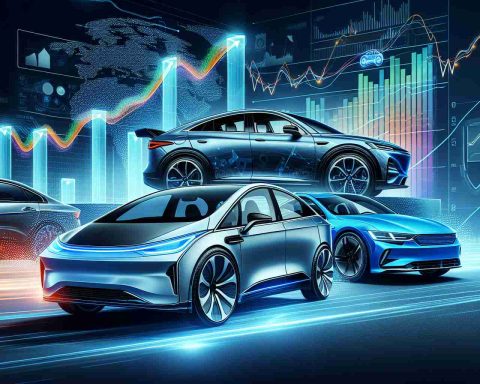- Global EV and plug-in hybrid sales reached 1.3 million, a 17.7% increase from last year.
- Europe and North America are catching up to China in the EV market, with Europe posting a 21% increase and North America a 22.1% rise in sales.
- Europe’s growth is driven largely by strict CO2 regulations, with Germany showing a remarkable 40% increase in EV sales.
- North America’s increasing EV adoption reflects a shift towards sustainable energy.
- France experienced a 52% decline in sales due to a weight tax on plug-in hybrids.
- China’s sales dipped in January due to the lunar New Year, indicating temporary disruptions.
- The global pursuit of sustainable energy is diversifying, with Europe and North America leading the charge in the electrification race.
Global interest in electric vehicles (EVs) and plug-in hybrids has soared, with monthly sales reaching 1.3 million—a striking 17.7% rise from the previous year. The numbers reveal a surprising shift in the world’s EV market dynamics.
Beneath the shimmering skyline of progress, Europe and North America have finally caught up with China, which had long been the dominant force in the electric tide. Europe posted a 21% increase, while North America surged ahead with a 22.1% leap, signaling a renewed vigor in the west that challenged China’s prior dominance.
Europe’s electrifying growth stems in part from stringent CO2 regulations. Despite winter’s lingering chill, this legislative push kindles a robust start for the sector. Germany, at the heart of Europe, leads the charge with a jaw-dropping 40% increase in EV sales, recovering from a downturn experienced when subsidies vanished overnight last year.
Meanwhile, across the Atlantic, North America’s impressive ascent underscores an industry shift, with more consumers embracing electric futures. Yet, amidst this rapid urbanization of green technology, not all statistics paint a rosy picture. France, grappling with a weight tax on plug-in hybrids, saw sales plummet by 52%, casting a shadow over the glittering success elsewhere.
But why has China—a perennial powerhouse—seemingly stumbled? The country’s celebration of the lunar New Year left an unexpected dent in January’s sales figures, offering a momentary lapse in its usual lead.
The clear takeaway: While China’s influence remains formidable, the global quest for sustainable energy is diversifying. Europe and North America’s leading strides suggest that the race for green supremacy has never been more electrifying or global.
The Electrifying Future of Global EV Markets: A Race to Green Supremacy
The global electric vehicle (EV) sector is experiencing an electrifying transformation, with monthly sales soaring to an impressive 1.3 million—an astonishing 17.7% increase over the previous year. This surge indicates a paradigm shift in the dynamics of the worldwide EV market. Europe and North America are rapidly catching up with China, the long-standing leader in this space.
Europe’s Commitment to Electrification
Europe has witnessed a remarkable 21% rise in EV sales, primarily fueled by stringent CO2 regulations that have sparked a robust start for the sector despite the chilling winter season. Germany is spearheading this movement, reporting a staggering 40% increase in sales, a significant rebound from last year’s slump when subsidies abruptly ended.
However, not all European countries are experiencing this surge. France is grappling with the introduction of a weight tax on plug-in hybrids, leading to a dramatic 52% fall in sales. This development highlights the potential impacts of taxation and regulatory policy on EV adoption.
North America’s Rapid Ascent
Across the Atlantic, North America boasts a 22.1% leap in EV sales. This increase reflects a significant societal shift towards embracing sustainable energy, driven by consumer demand and supportive policies. This trend underscores the growing awareness and acceptance of green technologies.
China’s Surprising Lapse
China, traditionally the powerhouse of the EV market, saw an unexpected dip linked to the lunar New Year festivities, which temporarily affected January’s sales figures. While this blip surprised many, China’s overall impact on the global EV market remains formidable.
Broader Implications and Insights
This global race for sustainable energy has profound implications for economies and industries worldwide. The increasing sophistication of battery technologies, the expansion of charging infrastructure, and heightened investment in renewable energy sources are crucial components in this green revolution.
Furthermore, the transition to electric vehicles can significantly reduce carbon emissions, resulting in improved air quality and public health. Countries and communities reshaping their infrastructure for this green future are poised to reap substantial economic and environmental benefits.
Critical Questions and Future Directions
As the EV market intensifies globally, several critical questions arise:
– How will policy changes influence the future of EV adoption in different regions?
– What technological advancements are necessary to maintain this growth trajectory?
– How can countries balance the economic impact of rapidly shifting from traditional automotive industries to electric?
The answers to these questions will shape the future of global energy dynamics.
For further reading and credible sources on electric vehicles and the transition to sustainable energy, explore the following links:
– International Energy Agency
– Organisation for Economic Co-operation and Development
The race for green supremacy has never been more electrifying or global, marking a new era where sustainable energy is at the forefront of technological and economic progress.



















